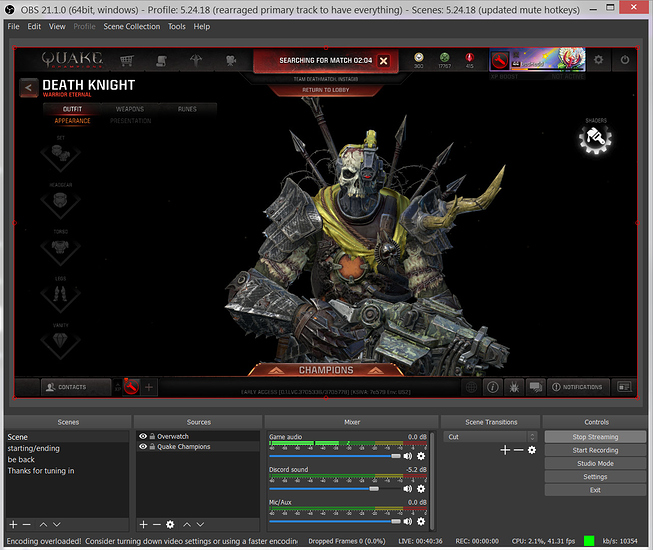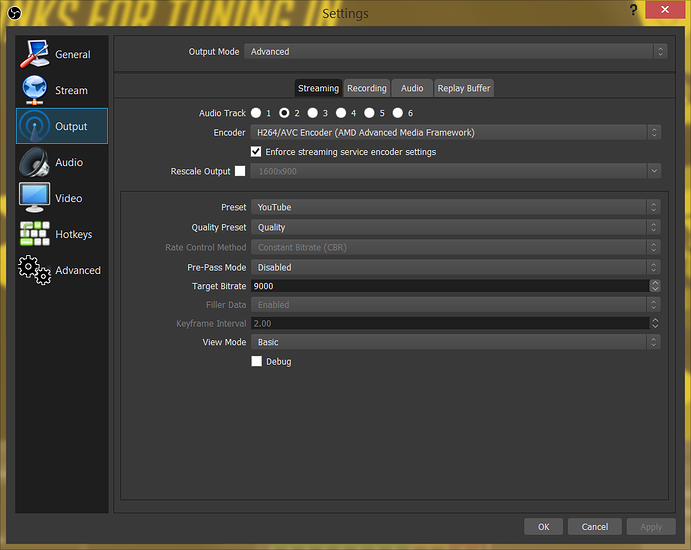I want to improve the quality of my stream so that the video is sharper.
Do I need a hardware upgrade or is there something in the software I need to change?
The Resolution I would like to hit is 1920x1080 60fps streaming to Youtube.
output stream example gameplay at 9m9s
when I watch it non full screen it is nice and sharp, but when I view the video in full screen it becomes blurrier
Quality I am looking for
Also I am getting an issue of an error of
Also I am getting an issue of an error of
encoding overloaded! consider turning down video settings or using a faster encodingwhen I alt tab out of any full screen application
output log
00:33:23.458: CPU Name: Intel(R) Core(TM) i7-5820K CPU @ 3.30GHz
00:33:23.458: CPU Speed: 3299MHz
00:33:23.458: Physical Cores: 6, Logical Cores: 12
00:33:23.458: Physical Memory: 16307MB Total, 10712MB Free
00:33:23.458: Windows Version: 6.3 Build 9600 (revision: 17415; 64-bit)
00:33:23.458: Running as administrator: false
00:33:23.458: Aero is Enabled (Aero is always on for windows 8 and above)
00:33:23.459: Sec. Software Status:
00:33:23.459: Windows Defender: enabled (AV)
00:33:23.460: Windows Firewall: enabled (FW)
00:33:23.460: Windows Defender: enabled (ASW)
00:33:23.460: Portable mode: false
00:33:23.554: OBS 21.1.0 (64bit, windows)
00:33:23.554: ---------------------------------
00:33:23.554: ---------------------------------
00:33:23.554: audio settings reset:
00:33:23.554: samples per sec: 48000
00:33:23.554: speakers: 2
00:33:23.556: ---------------------------------
00:33:23.556: Initializing D3D11...
00:33:23.556: Available Video Adapters:
00:33:23.556: Adapter 1: AMD Radeon (TM) R9 Fury Series
00:33:23.556: Dedicated VRAM: 4266143744
00:33:23.556: Shared VRAM: 4026531840
00:33:23.556: output 1: pos={0, 0}, size={1920, 1080}, attached=true
00:33:23.556: output 2: pos={1920, -756}, size={3840, 2160}, attached=true
00:33:23.558: Loading up D3D11 on adapter AMD Radeon (TM) R9 Fury Series (0)
00:33:23.565: D3D11 loaded successfully, feature level used: 45056
00:33:24.255: ---------------------------------
00:33:24.255: video settings reset:
00:33:24.255: base resolution: 1920x1080
00:33:24.255: output resolution: 1920x1080
00:33:24.255: downscale filter: Lanczos
00:33:24.255: fps: 60/1
00:33:24.255: format: NV12
00:33:24.255: YUV mode: 601/Partial
00:33:24.256: Audio monitoring device:
00:33:24.256: name: Default
00:33:24.256: id: default
00:33:24.256: ---------------------------------
00:33:24.257: Required module function 'obs_module_load' in module '../../obs-plugins/64bit/chrome_elf.dll' not found, loading of module failed
00:33:24.258: [CoreAudio encoder]: CoreAudio AAC encoder not installed on the system or couldn't be loaded
00:33:24.459: [AMF] The AMF Runtime is very old and unsupported, consider updating your drivers.
00:33:24.459: [AMF] Version 2.3.3 loaded (Compiled: 1.4.4.0, Runtime: 1.4.2.0, Library: 1;4;2;0;17.10.1731;201704242122;CL#1401971).
00:33:24.499: [AMF] <Id: 2> Unable to create H265/HEVC encoder, error AMF_ENCODER_NOT_PRESENT (code 36)
00:33:24.533: [AMF] <Id: 4> Unable to create H265/HEVC encoder, error AMF_ENCODER_NOT_PRESENT (code 36)
00:33:24.533: [AMF] [H265/HEVC] Not supported by any GPU, disabling...
00:33:24.547: Required module function 'obs_module_load' in module '../../obs-plugins/64bit/libcef.dll' not found, loading of module failed
00:33:24.548: LoadLibrary failed for '../../obs-plugins/64bit/libEGL.dll': The specified procedure could not be found.
00:33:24.548: (127)
00:33:24.548: Module '../../obs-plugins/64bit/libEGL.dll' not loaded
00:33:24.548: Required module function 'obs_module_load' in module '../../obs-plugins/64bit/libGLESv2.dll' not found, loading of module failed
00:33:24.549: [browser_source: 'Version: 1.31.0']
00:33:24.552: LoadLibrary failed for 'nvEncodeAPI64.dll': The specified module could not be found.
00:33:24.552: (126)
00:33:24.756: Couldn't find VLC installation, VLC video source disabled
00:33:24.759: No blackmagic support
00:33:24.762: ---------------------------------
00:33:24.762: Loaded Modules:
00:33:24.762: win-wasapi.dll
00:33:24.762: win-mf.dll
00:33:24.762: win-dshow.dll
00:33:24.762: win-decklink.dll
00:33:24.762: win-capture.dll
00:33:24.762: vlc-video.dll
00:33:24.762: text-freetype2.dll
00:33:24.762: rtmp-services.dll
00:33:24.762: obs-x264.dll
00:33:24.762: obs-vst.dll
00:33:24.762: obs-transitions.dll
00:33:24.762: obs-text.dll
00:33:24.762: obs-qsv11.dll
00:33:24.762: obs-outputs.dll
00:33:24.762: obs-filters.dll
00:33:24.762: obs-ffmpeg.dll
00:33:24.762: obs-browser.dll
00:33:24.762: image-source.dll
00:33:24.762: frontend-tools.dll
00:33:24.762: enc-amf.dll
00:33:24.762: coreaudio-encoder.dll
00:33:24.762: ---------------------------------
00:33:24.762: ==== Startup complete ===============================================
00:33:24.766: All scene data cleared
00:33:24.766: ------------------------------------------------
00:33:24.779: WASAPI: Device 'VoiceMeeter Input (VB-Audio VoiceMeeter VAIO)' initialized
00:33:24.787: WASAPI: Device 'Hi-Fi Cable Input (VB-Audio Hi-Fi Cable)' initialized
00:33:24.799: WASAPI: Device 'VoiceMeeter Aux Output (VB-Audio VoiceMeeter AUX VAIO)' initialized
00:33:24.813: adding 21 milliseconds of audio buffering, total audio buffering is now 21 milliseconds
00:33:25.375: Switched to scene 'Thanks for tuning in'
00:33:25.375: ------------------------------------------------
00:33:25.375: Loaded scenes:
00:33:25.375: - scene 'Scene':
00:33:25.375: - source: 'Quake Champions' (game_capture)
00:33:25.375: - source: 'Overwatch' (game_capture)
00:33:25.375: - scene 'starting/ending':
00:33:25.375: - source: 'static' (image_source)
00:33:25.375: - source: 'Stream Starting Soon' (text_gdiplus)
00:33:25.375: - scene 'be back':
00:33:25.375: - source: 'BRB' (image_source)
00:33:25.375: - scene 'Thanks for tuning in':
00:33:25.375: - source: 'thanks' (image_source)
00:33:25.375: ------------------------------------------------
00:33:25.570: adding 21 milliseconds of audio buffering, total audio buffering is now 42 milliseconds
00:35:58.224: Settings changed (outputs)
00:35:58.224: ------------------------------------------------



